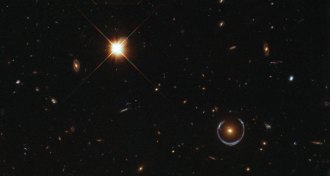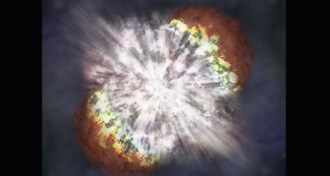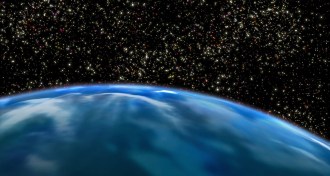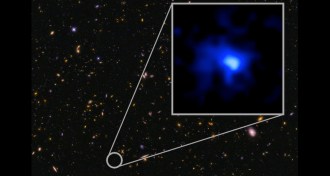Cosmology
-
 Quantum Physics
Quantum PhysicsQuantum interpretations feel the heat
Landauer’s principle shows a way to test competing interpretations about quantum physics.
-
 Science & Society
Science & SocietySpecial Report: Gravity’s Century
After years of pondering the interplay of space, time, matter and gravity, Einstein produced, in a single month, an utter transformation of science’s conception of the cosmos: the general theory of relativity.
-
 Particle Physics
Particle PhysicsNeutrinos’ identity shift snares physics Nobel
Arthur McDonald and Takaaki Kajita shared the 2015 Nobel Prize in physics for the discovery that neutrinos oscillate between different types, which demonstrates that the particles have mass.
By Andrew Grant and Thomas Sumner -
 Astronomy
AstronomyUsing general relativity to magnify the cosmos
Astronomers have Einstein to thank for the tools that bring far-away galaxies and maybe even black hole collisions into view.
-
 Particle Physics
Particle PhysicsDiscovery of neutrino mass earns 2015 physics Nobel
The discovery that subatomic particles called neutrinos have mass has won Takaaki Kajita of the University of Tokyo and Arthur McDonald of Queen’s University in Kingston, Canada, the 2015 Nobel Prize in physics.
By Andrew Grant -
 Science & Society
Science & SocietyCentennial books illuminate Einstein’s greatest triumph
Scholars mark general relativity 100ths anniversary with books on history, biography, science.
-
 Cosmology
CosmologyComplexity in the universe, hidden craters and more reader feedback
Readers discuss order and disorder in the universe, the languages of science communication and more.
-
 Neuroscience
NeurosciencePutting time’s mysteries in order
Investigating both the orderly and disorderly dimensions of time provides the focus for a special issue of Science News.
By Eva Emerson -
 Physics
PhysicsThe arrow of time
Gravity may explain how time always runs forward, even though the laws of physics should permit it to run backward.
By Andrew Grant -
 Cosmology
CosmologyBrightest supernova breaks record
A recent supernova shines with the light of 600 billion suns.
-
 Astronomy
AstronomyIn another universe, free-range planets could host life
If other universes exist, then those with denser galaxies might harbor a larger fraction of habitable worlds.
-
 Astronomy
AstronomyAmorphous space blob takes title for most distant galaxy
The new record holder for the most distant galaxy is a blob of 8 billion stars whose light took more than 13 billion years to reach Earth.